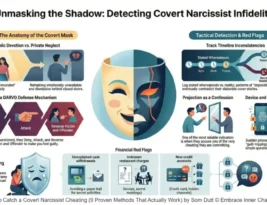Learn how to identify narcissistic traits in your brother with this step-by-step quiz. Protect your emotional well-being today. …
Blog Posts
Identify narcissistic eyes with 7 key signs, including intense stares, emotional voids, and manipulative gaze patterns. Learn how these traits reveal behavior. …
Understand covert narcissist post-breakup behaviors like silent treatment, smear campaigns, and hoovering. Learn why they act this way and how to protect yourself. …
Unmask female narcissists over 50 with these essential recognition strategies. Aging narcissists use distinctive manipulation tactics—learn to protect your boundaries today. …
Discover 7 facial tells that expose narcissists—contempt smirks, predatory stares, and micro-expressions revealing hidden arrogance. …
Understand high-functioning narcissists, their traits, and behaviors. Learn how to identify them and protect your emotional well-being in relationships and work. …
Understand the traits of a neglectful narcissist, their impact on relationships, and how to set boundaries. …
Do Narcissists’ Black Eyes Reveal a Disturbing Secret? …
The Science Behind Crafting the Perfect Yellow Rock Reply (It's Easier Than You Think!) …
Identifying Subtle Manipulations and Impact of Covert Narcissistic Sister on Family Dynamics …
Covert Narcissist Smirk signals hidden contempt and manipulation. Spot facial cues and protect your emotional health from subtle narcissistic abuse. …
Discover 9 proven methods to catch a covert narcissist cheating using psychology-backed detection strategies and real victim experiences …
Does Justin Bieber a Narcissist label fit? Analyze his public behavior, entitlement, and growth to see if he matches narcissistic traits or not. …
Does Gene Simmons a Narcissist fit? This analysis reviews his entitlement, celebrity culture, and public behavior to answer the question directly. …
Establish Paris Hilton a Narcissist as the archetypal “famous for being famous” celebrity whose 25-year public persona provides unprecedented evidence for analyzing pathological narcissism versus trauma-driven behaviors, setting up a trait-by-trait clinical evaluation. …












